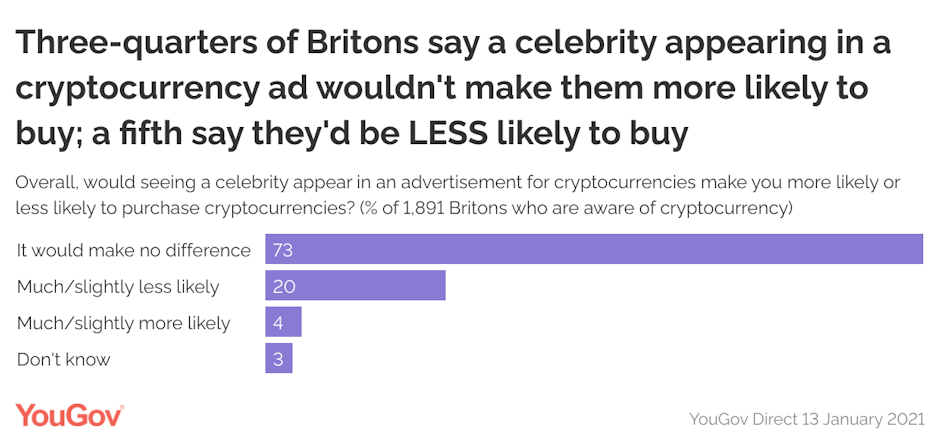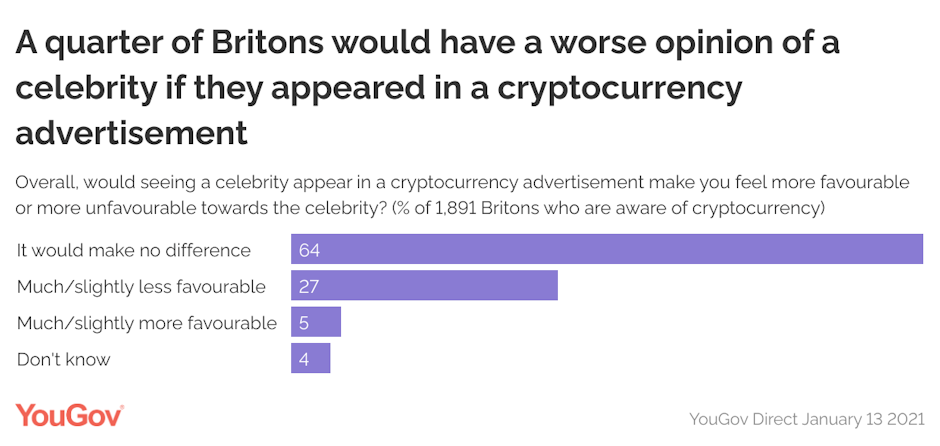The Drum has previously delved into the murky world of cryptocurrency advertising and asked whether stricter regulation was needed. Now, as UK ad regulators plan for a crackdowns on crypto, YouGov’s Amelia Brophy takes a look at how effective the sector’s use of celebrities in marketing efforts have been so far.
In further evidence that cryptocurrency is going mainstream, the last six months have seen a number of celebrities appear in marketing and advertising about coins and coin-related themes. These aren’t Z-Listers on the career downswing, either. Kim Kardashian West, Jake Paul, Matt Damon and Spike Lee have all been promoting cryptocurrency and cryptocurrency services in the past year.
But is this marketing likely to work? And at a time when the government is launching a crackdown on cryptocurrency ads, is it likely to do anything for these celebrities’ brands?

Ask the British public and three-quarters (73%) say they wouldn’t be more likely to buy Bitcoin, Ethereum or any other coin if they saw a celebrity in an ad for it, while a fifth (20%) say they’d be less likely to do so. Just 4% say they’d be more likely to buy cryptocurrency following a famous person’s endorsement.
As for the celebrities themselves, they may need to be wary about their own brand. Nearly two-thirds (64%) of Britons say seeing a famous person in cryptocurrency ad would make no difference to their overall opinion of that person. However, a quarter (27%) say they would have a less favorable view of anyone making a crypto endorsement, compared to just 5% who say the reverse. Celebrities and their PR firms therefore have to balance the immediate financial rewards of doing a crypto ad with the potential damage to their brand value.

Lee’s Gotta Have (B)it
But is there method behind the madness or are crypto firms using any available celebrity within their budget?
While the answer obviously varies, some of these ads are pitched at a specific audience. Let’s take Spike Lee, whose Coin Cloud commercial made waves last year. The ad differentiates between ’oppressive’ old money and cryptocurrency, which the campaign would have you believe is the more liberated ’new money’. The theme leveraged the director’s long association with issues of social and racial justice to rather mixed reception.
But looking at the average Spike Lee fan on YouGov Profiles shows that it was targeted at the right audience. His fans are significantly more likely to agree that ’cryptocurrencies are the future of online financial transactions’ compared to the general public (26% v 18%). They’re also just as likely to be aged 18-24 as the rest of the nation (28% v 29%), significantly more likely to be aged 35-54 (47% v 34%) – which makes sense, given Spike Lee’s emergence in the 80s and 90s – and much less likely to be over 55 (25% v 38%).
More importantly, Spike Lee fans are more likely to have money to invest in cryptocurrency. Some 35% have over £500 a month in disposable household income compared with a quarter (23%) of the wider nation.
It’s a similar situation with Matt Damon: fans of the star are also more likely to be 35-54 (38% v 34% of the wider nation), just as likely to be young (29% v 29%) and less likely to be under-55 (33% v 38%). They are also slightly more likely to have over £500 a month in disposable income and are mildly more likely to agree that crypto is the future of online financial transactions.
So as incongruous as it may seem for the star of Good Will Hunting or the director of She’s Gotta Have It and BlacKkKlansman to act as pitchmen for notoriously volatile financial investments, there may be sound reasoning behind it from a marketing perspective.

No Comments Yet